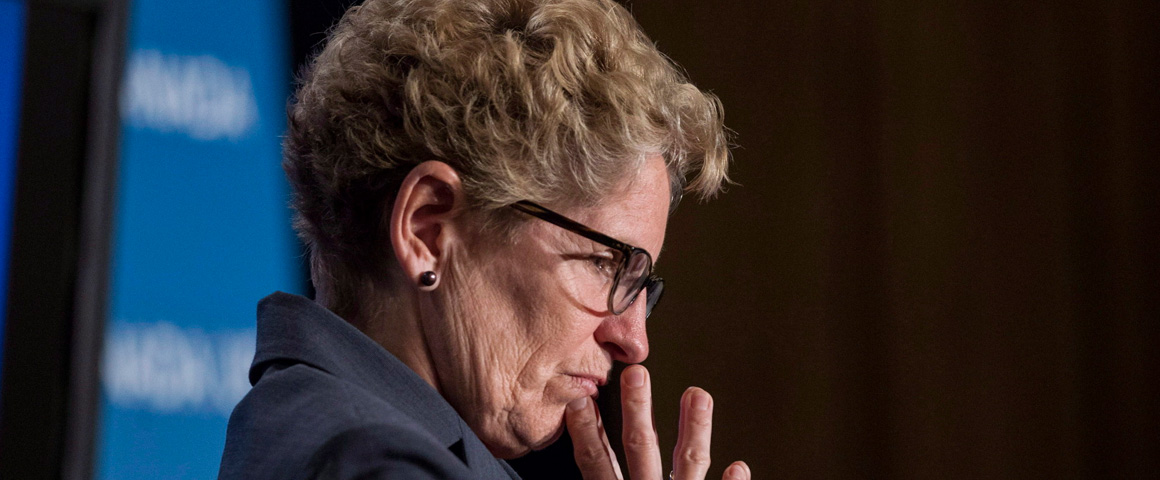Great Lakes Power Transmission in Sault St. Marie, Orillia Power Distributing Corporation, Peterborough Distribution Inc., Wellington North Power in Mount Forest, Haldimand County Utilities, Guelph Hydro, Toronto Hydro. Over the past three years Hydro One, Ontario’s largest publicly owned electricity transmission and distribution utility, has moved to purchase a wide swath of local utilities, most of them publicly owned.
On the surface, it sounds okay – Hydro One’s public argument has been that the mergers make the public electricity system more efficient and effective, yielding lower costs and greater reliability. Public-to-public takeovers are a win-win deal for everyone, right?
Not so fast.
You don’t have to scratch too far under the surface to see the dangers of Hydro One’s expansion, and the real motivation behind it. The utility itself is in the process of being sold off, in the largest single privatization in Canada’s history. The Liberal government of Kathleen Wynne is defying massive opposition – 83% of the public oppose the sale, and half of the province’s municipalities have passed motions against it – to push the privatization along in a series of share batches. Half of the 60% stake has been sold, but sale of the remaining shares has been delayed through a combination of stalled share price, political pressure, and a lawsuit launched by CUPE Ontario.
The government’s pause in the active sale has allowed them room to make Hydro One more attractive to private buyers, and to try to spin the sale as beneficial to the public. This is where the merger with local utilities really comes in.
On the one hand, the government can make the case to local communities that the merger relieves them of a debt-ridden utility with a huge deferred maintenance bill. Instead of paying to upgrade local transmission infrastructure, communities will benefit from letting the highly capitalized Hydro One do the job. By promising to pass on the savings achieved through “rationalization”, local electricity consumers will enjoy lower rates which will stimulate local economic growth. The discourse moves from Hydro One moves as political maelstrom, to Hydro One as modern, sensible solution.
On the other hand, buying up local utilities extends Hydro One’s operations closer and closer to monopoly status, eliminating competition and further marginalizing public-ownership as an existing alternative. Along the way, jobs are shed, wages and pensions are reduced, local accountability is marginalized, union strength is diminished, and infrastructure upgrades are paid by the public. The whole package looks a lot more attractive to corporate profiteers.
This plan isn’t that new, either. In 2012 the Ontario government created the Ontario Distribution Sector Review Panel, with a mandate to make recommendations for cost savings through consolidation of the province’s 80 local distribution companies. The panel recommended a brief opportunity for voluntary mergers, followed by mandatory mergers that would be concluded within a two-year period. The overwhelming thrust of the panel’s anticipated benefits were in the area of increased competitiveness and efficiency. Notably, the panel stated that it took no view on privatization, but proceeded to outline several sweeping benefits of privatizing at least a portion of the consolidated utility.
Within two years, this “nuanced” proposal for privatization through consolidation had become much more blatant. In 2015 the Premier’s Advisory Council on Government Assets decided to “revise their conclusion about Hydro One” and recommend that a portion of the utility be sold to the private sector. Interestingly, the Council explicitly stated the province should privatize Hydro “whether or not the government needed the revenue to finance infrastructure investments.” Consolidation had opened the door to privatization for the sake of privatization.
While the government, Hydro One and private sector are all pushing hard for further mergers as a way to sweeten the sell-off, labour and community activists are responding with equal fervor. All of the deals mentioned above, whether or not they have been completed yet, have been met with strong local opposition. This fightback is rooted in the province-wide community-labour solidarity that has developed and been sustained in the campaign against the sale of Hydro One. As such, it tends to take a non-parochial approach that relates the privatization of local utilities to bigger provincial economic issues.
A notable example is in Guelph, where opposition to the pending merger of Guelph Hydro with Hydro One includes the local Communist Party organization. In its brief to a special meeting of Guelph City Council, CPC-Guelph noted, “The Hydro One privatization is increasing hydro rates, especially in rural communities, reducing long term revenue for the province of Ontario, and taking away an opportunity for Ontario to democratically plan our energy network and better invest in public green energy. If Guelph Hydro is sold off, there will be similar negative results for people in Guelph.”
The CPC-Guelph brief goes on to expose the reality that provincial tax cuts over the past 20 years, which add up to $18 billion in lost public revenue each year, far outweigh any perceived funding through privatization. It notes that consolidation in the current context of privatization will lead to a loss of local revenue, loss of jobs and wages, reduced infrastructure investments, and loss of transparency and local input.
The real way forward for Ontario’s electricity system is through expanded public ownership and democratic control. This includes all aspects of the electricity industry – production, transmission and distribution.
The level of organized opposition to the sell-off of Hydro One provides a rarely-found concrete basis for mass mobilization that can halt and reverse the privatization process, putting all of the electricity industry under public ownership. This is the only platform from which we can ensure economic, social and environmental stewardship of this key sector in Ontario society.




